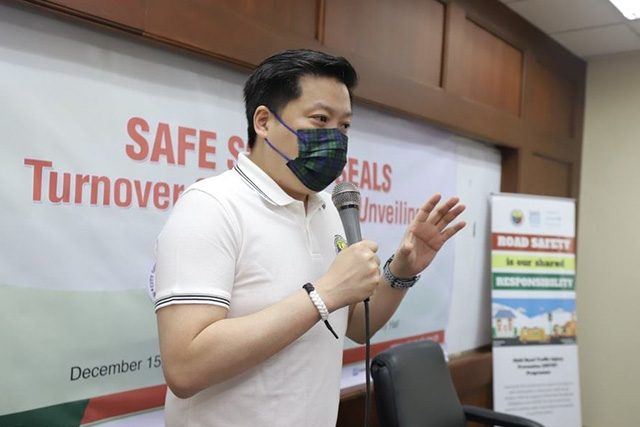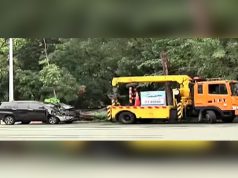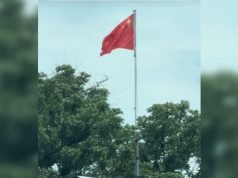
The city government of Valenzuela will continue to be vigilant after striking a deal with NLEX Corp. over issues with the radio-frequency identification (RFID) system that triggered heavy congestion.
Valenzuela City Mayor Rex Gatchalian on Wednesday shared pictures of the city government meeting with officials of the toll operator where they reached an agreement on solving the traffic woes involving toll gates.
“We’ll be watching you as well as working with you. This was our signing with NLEX this morning. Barriers up!!!” he tweeted.
Based on the agreement, there would be no barriers to the RFID lanes from 5 a.m. to 10 p.m. daily. Toll fees would also be collected during the specified hours.
By 10:01 p.m. to 4:59 a.m., the barriers will be lowered on RFID lanes for safety reasons.
Cash lanes will also be reinstated in strategic locations in the toll plazas.
The RFID system and managing of accounts should also be upgraded to address continuing consumer complaints on or before Jan. 31, 2021.
“Both parties have also agreed to create a technical working group, composed of CGOV (city government of Valenzuela) and NLEX key personnel, who will continuously meet to innovate traffic and account management initiatives,” the agreement added.
Gatchalian said the local government would hold NLEX Corp. to the agreement that issues on account management are resolved by the end of January 2021.
“Ang bahagi ng agreement namin, by January 30, 2021… kailangan tapos na yung system upgrade nila. Kung hindi, pwede na naman silang ma-suspend ulit,” he said to CNN Philippines’ “Balitaan.”
A look back on the road mess
In a bid to reduce the transmission of the coronavirus disease, the Department of Transporation (DOTr) sought the immediate rollout of cashless payment systems on public transport, including in expressways.
Instead of handing cash at toll gates, motorists would only have their electromagnetic stickers (the RFID) be automatically read by a sensor for a supposed swift passage.
The DOTr allowed its full implementation on December 1 despite giving motorists only a short time to secure the stickers that immediately ran out of stock. It also allowed that two different RFID systems would be used on different tollways by separate private operators.
This resulted in massive gridlocks in areas near the toll gates, particularly the main highway traversing Valenzuela, due to the number of vehicles installing RFID stickers.
An automobile magazine described the incident as a major “carmageddon.”
ALSO READ: ‘System failure’: RFID users refute NLEX official’s remark on toll traffic attributed to low balance
The registration itself also confused Filipinos since there were two toll collection providers, Easytrip and Autosweep, that were initially not integrated with each other.
By December 5, Gatchalian threatened to suspend the business permit of NLEX Corp. due to the heavy traffic caused by the implementation of the RFID system.
He said that he has similarly raised the problem of “primitive sensors” with the tollway seven years ago.
“Until you get your act together and perfect your existing tollway system, the city government may withdraw as your partner in your future planned expansions in our jurisdiction,” Gatchalian said in a letter to NLEX chief operating officer Raul Ignacio before.
NLEX was given a deadline to comply with Valenzuela’s demands but it remained unfulfilled. This led Gatchalian to issue a suspension order against its business permit on December 7.
A “toll holiday” was also enforced wherein toll booths within the city’s jurisdiction were not allowed to collect fees from the passing motorists. The barriers on the gates were also kept up at all times.
The following day, it was reported that NLEX will seek a “series of dialogues” with Gatchalian over the business permit suspension.
NLEX Corp. president J. Luigi Bautista said the glitches on the RFID system were to be expected since its implementation was only in the early stage.
By December 14, the Senate adopted a resolution urging for DOTr to suspend the cashless payment scheme on expressways until the surrounding issues have been fixed.
RELATED: Opposing ‘silly’ RFID system, Sotto suggests replication of automated San Francisco Bay Bridge tolls
Two days after, the city government of Valenzuela and NLEX agreed that cash lanes would be reinstated in strategic locations of the toll plazas, among others.
The suspension on NLEX’s business permit was likewise conditionally lifted.









